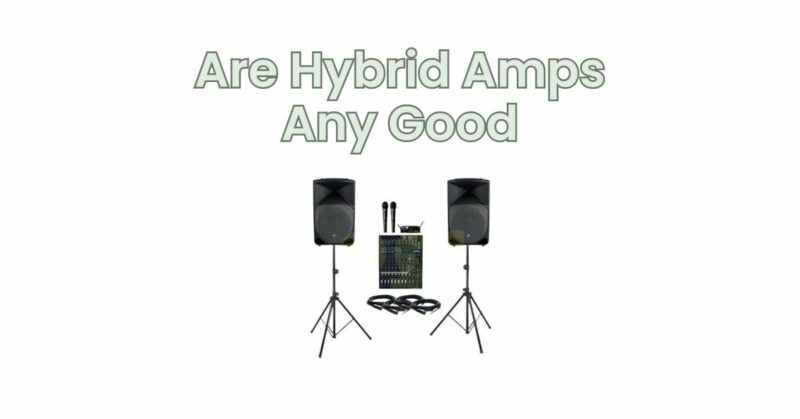Hybrid amplifiers have gained popularity in the audio world as they combine the best features of both tube and solid-state amplifiers. These unique amplifiers offer a balance between the warmth and richness of tube amps and the efficiency and reliability of solid-state amps. However, if you’re considering investing in a hybrid amplifier, you may wonder if they are truly worth it. In this article, we will explore the pros and cons of hybrid amplifiers to help you determine if they are a good choice for your audio setup.
Pros of Hybrid Amplifiers:
- Warmth and Harmonic Richness: One of the primary advantages of hybrid amplifiers is their ability to provide a warm and harmonically rich sound. They inherit some of the characteristics of tube amplifiers, which are known for their pleasant distortion and smooth tonal response. This can result in a more engaging and musical listening experience.
- Improved Efficiency and Reliability: Unlike pure tube amplifiers, hybrid amplifiers incorporate solid-state components that enhance their efficiency and reliability. Solid-state circuitry ensures stable operation, reduces maintenance requirements, and eliminates the need for tube replacement. Hybrid amplifiers often have longer lifespan and lower operating costs compared to full tube amplifiers.
- Power and Control: Hybrid amplifiers can deliver significant power output, making them suitable for driving a wide range of speakers. The solid-state portion of the amplifier provides sufficient current and control to accurately reproduce music across different frequency ranges. This combination of power and control enables the amplifier to drive both sensitive and demanding speakers effectively.
- Versatility and Flexibility: Hybrid amplifiers often feature additional features and connectivity options, such as multiple inputs, tone controls, headphone outputs, and even built-in DACs (Digital-to-Analog Converters). These features make hybrid amplifiers versatile and adaptable to various audio sources and preferences, allowing you to customize the sound to your liking.
Cons of Hybrid Amplifiers:
- Cost: Hybrid amplifiers can be more expensive compared to entry-level solid-state amplifiers due to the added complexity of combining tube and solid-state technologies. Higher-quality components and design considerations contribute to the overall cost. However, it’s worth noting that the price range for hybrid amplifiers varies, and there are options available at different price points.
- Limited Tube Character: While hybrid amplifiers offer some of the characteristics of tube amplifiers, purists argue that they may not fully replicate the tonal qualities and sonic magic of a high-end tube amplifier. The solid-state portion can slightly attenuate the richness and organic nature of the tube sound, although the trade-off is improved reliability and efficiency.
- Maintenance: Although hybrid amplifiers require less maintenance compared to pure tube amplifiers, they still have tubes that may need occasional replacement. While tube longevity is typically longer in hybrid amplifiers compared to full tube amps, the cost and effort associated with tube replacement should be considered as part of the ongoing maintenance.
Conclusion: Hybrid amplifiers offer a compelling combination of tube-like warmth and solid-state efficiency, making them a good choice for many audio enthusiasts. They provide a harmonically rich sound, improved efficiency, power, and versatility. However, it’s essential to consider the cost, potential trade-offs in tube character, and ongoing maintenance requirements. Ultimately, the decision to invest in a hybrid amplifier depends on your audio preferences, budget, and desired balance between tube aesthetics and solid-state reliability. It’s recommended to listen to different models, read reviews, and consult with audio professionals to find the hybrid amplifier that suits your specific needs and brings out the best in your audio system.


